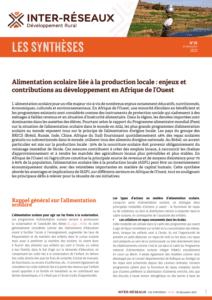The central issue in this study is the search for opportunities for livestock development to enhance food security in West Africa through aid and trade. The report discusses win-win and trade-offs between aid and trade, reflecting a rather traditional divide between development aid and economic development. Nowadays the notion public and private might replace that of aid and trade.
Main conclusions in this report are:
Much is possible for aid and trade in West Africa, provided a flexible and creative approach is taken.
Much is known in the region from earlier [Dutch] work on technical, social and ecological aspects and trade-offs in livestock development of West Africa, as described in this report, but further review and update is suggested.
Basic definitions and commonly used concepts (e.g. on food security as well as quantitative (notions of open borders and illegal taxes) should be used clearer to improve the discussions.
Statistics are too unreliable to permit accurate descriptions.
Many (socio-economic and biophysical) drivers can be identified that influence the changes in livestock production system in West Africa.
Four major production systems are recognised: pastoral, mixed (off- and on-farm), intensive pigs, poultry and some dairy, and last but not least backyard farming. In addition, value chains are segmented into micro-, meso-, and macro-scale markets, implying a change from informal to formal markets, and from local to (inter) national.
All systems are subject to change, examples are greater intensity of mixing, Vergetreidung (shift of diets of poorer sections of society to more dependency on products from plant origin), and a desire for more local sourcing (not easy for milk).
The largest trade-offs for policy decisions are likely to occur in the need to decentralize processing and larger food chains, or in other words, in relative priority of local vs. (inter-) national markets.
More detailed conclusions and recommendations are presented in five categories: context of livestock production; main animal production sectors; challenges; opportunities; and policy choices and tradeoffs. Overall the report strikes a cautious note, because of difficulties for trade, but more due to the challenge in finding a balance between aid and trade. The proper balance deserves more attention, rather than assuming a straightforward win-win. The authors think that further work in this field will find more creative opportunities rather than hidden problems.
Read the report (101p., 3,5Mo):
http://edepot.wur.nl/292476







